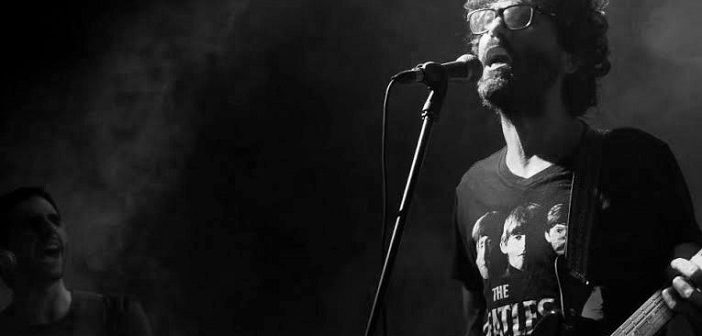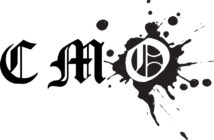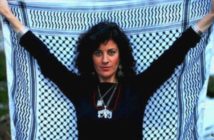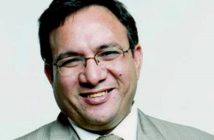Jowan Safadi has just finished his European tour playing in Berlin, Helsinki and other cities. Since the 90s Safadi has constantly created different projects. One genre coined by Safadi is called “Free Arabic Rock”, which he created with his band Fish Samak, and in which he juggles between various genres and issues defining the life he finds himself in.
Palestinian Singer Songwriter Jowan Safadi was born in Nazareth and music has been on his mind since he can remember but he started to pursue music only after he had been travelling. He went to school in Nazareth and studied Philosophy and English literature for a couple of years. In the past he wrote a lot of poetry and noted down what came into his mind, which would be translated into songs later on. While visiting India, he bought a guitar and gradually developed his musical skills. He released his first solo Album Namrud (Troublemaker) in 2012. Troublemaker has established the soundscape and the personal note of Jowan Safadi, which is to be found somewhere between rock and other multiple genres, not confining his music into only one genre. Nevertheless, he notes, the album should be listened to according to the suggested order. The content of his songs are equally concerned with multiple issues – political, social issues but personal issues as well.
In 2012 he faced problems with the songs Poor Infidels and Birds of Fire. After he played gigs in Amman, the songswere blasphemous for the authorities and this was the reason why he was jailed for 26 hours. He does not want to call himself a political artist because as he argues “I sing about life, my life in which politics play a big role, but I have many other interests and aspects. That is why the definition of me as a ‘political artist’ is not quite accurate. Yet, early in 2013, I faced investigations and accusations of incitement by the Israeli police, and I receive hate mails every now and then.”
His musical archive can be seen as a testament for his personal life, which is interwoven with the political, social and cultural context in which he grew up, being a Palestinian artist who has experienced playing music both in the Arab and Jewish world. He still does not shy away from addressing controversial, political issues and emphasizing them with his band as for example in one of his recent songs To Be An Arab which deals with sensitive political issues.
“Sephardics or Mizrachis once they too were Arabs. They changed their names to change their destiny. Because they know, they know best, it’s hard to be an Arab”.
He developed several projects he calls his own – the first one was a band called Lensens with which he released three albums (Shortcuts, 2001. i.d., 2003, Ahlan Byebye, 2009). His avant-garde style was new in his region – where not many other bands existed at that time, which can be compared with Safadi’s projects. His first project Lensens was a collaboration with Yohanan Kressel (guitar, backing vocals), Etan Fisher (bass, backing vocals and tambourine), with the help of David Perez, and was the first stage of the “Arabic Rock Free” genre that Safadi coined later with Fish Samak. Lensens was based in Beer Sheva and many of the songs were in English such as in the 2001’ Album Shortcuts which can be listened to on Bandcamp. With Lensens Safadi wanted to find his style, his music and if you listen at least to the Album Shortcuts, songs like Blowing Baloons and The Bad Son are not yet so experimental as his later works. It was not a progressive rock style yet – more an experimental, alternative indie sound.
The second band was Fish Samak, which is based in Haifa. The current formation of Fish Samak consists of Jowan Safadi (vocals, red guitar), Tamer Omari (bass guitar), Bshara Reziq (guitar and synth), Jebus Khoury (drums). Previous members were Haya Zaatry (guitar backing vocals) and Jameel Matar (drums, backing vocals) until September 2013. It is difficult to pinpoint his musical style but Safadi tries to explain it this way: “I can’t define the style so I really like to call it free Arabic rock. It’s free to sound sometimes more Arabic, sometimes more rock, but it is free to go to more punk, metal, reggae, rap and experimental.”
Safadi appreciates to have a band like Fish Samak because he says that: “It is priceless to play your songs with a band of creative and talented people who boost the energy of the songs which blow through my mind on many levels. We play songs from different eras.” Influences range from east to west, from old to new. A proper genre cannot be recognized but the 90s Grunge, more precisely the Seattle Sound which was shaped by bands such as Nirvana are one of his influences. But not only Nirvana was an influence, his style ranges between many genres and between many regions. Fish Samak covered a song by Nirvana called Dumb which they did not only cover but interpreted in Arabic as well. The song was accompanied by Akher Zaphers’ Basem Sayej (singer and songwriter) In the song description he writes why they reinterpreted the song: “I am a Palestinian musician, who was there when Nirvana first happened and part of me stayed there until this day. Now, after 18 years of a colourful musical journey, I can admit that Nirvana has been a turning point and will always be an important element in my musical evolution.”
The progressive rock style became much more apparent in the later songs of Lensens which made a transition to Fish Samak. Even though Fish Samak has not released an album yet, they have existed for four years now, and in a scene, which is changing and in the flux very much all the time, it cannot be taken for granted that they are still around. One of Fish Samak’s songs In the Arms of Occupation is a very strong song – addressing both not only the revolutions in the Arab countries but it is concerned with Palestine as well. It is an intoxicating song, the sound of which is clearly influenced on the one hand by some of the bands that defined the Seattle Sound which thrived back in the 1990s but on the other hand clearly shows the own handwriting of Fish Samak. It is one of the many songs of Fish Samak which define their “Free Arabic Rock”. In the Arms of Occupation is not only a song, it is also a documentary directed by Fernando Romero-Forsthuber narrating his story. Nevertheless Safadi enriches the music scene of the region through his various projects making it more diverse and he plays an important part helping to shape it.
His other project, which is in the same spirit as Fish Samak and Lensens but has a totally different sound, is called Abo Jar and was established together with Jebus Khoury, who is the drummer of Fish Samak. He explains how the idea of Abo Jar came into being “my flirting with electronic music comes from my love to experiment and creating endless possibilities. It allows me to say and play what I want with much fewer rules. It was fun and a spontaneous collaboration”. In the context of creating songs, he explains that he does write songs usually when he feels that he is not at ease and doesn’t know what to do. “Sometimes I start from a passing idea, or a sentence I later develop into song. Sometimes I start with some guitar riff or melody that I fit lyrics to… sometimes it just comes all together.”
His perceptions of his surroundings are transferred into the songs and serve to build an archive of the struggles that surround him. He can be described as a “free thinker” who believes in the things he is doing and in his songs. One of his next projects will be to release the first album of Fish Samak. Trying to describe what his work means for him, he says: “I felt like a pioneer experimenting, exploring and creating in the dark, until it started to sound natural. Not eastern, not western, but something new. I like to believe that together with musicians of my generation, we manage to create that missing reference, alternative and inspiration for the new generation of musicians now thriving in Palestine and the rest of the Arabic world.”





